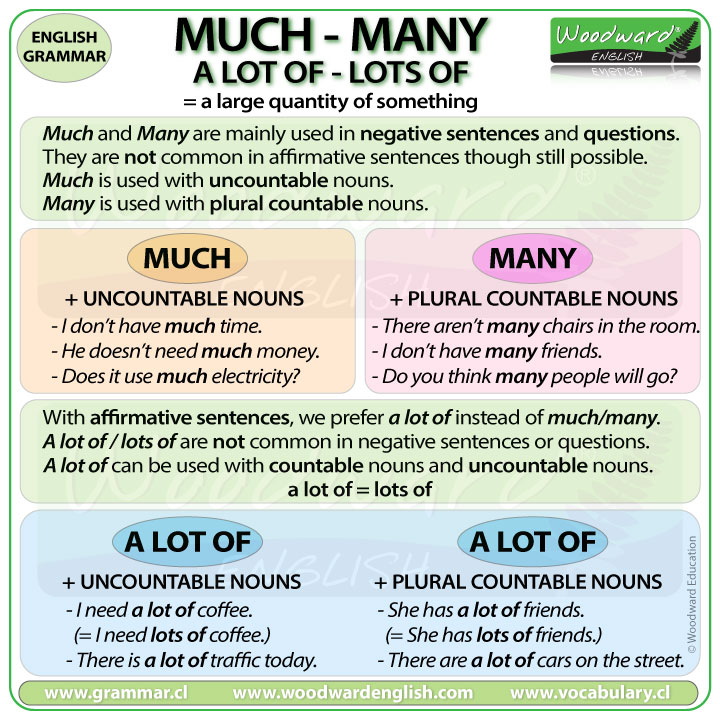Much vs. Many vs. A lot of
Much and Many are used to express that there is a large quantity or a large amount of something.
- Much is used with uncountable nouns
- Many is used with plural countable nouns
See our video about countable and uncountable nouns if you are not sure what they are.
Let’s look at much and many in more detail.
MUCH
Much is used with uncountable nouns.
- I don’t have much time.
- He doesn’t need much money.
- Does it use much electricity?
Time, Money and Electricity are uncountable nouns so we use MUCH before them.
MANY
Many is used with plural countable nouns
- There aren’t many chairs in the room.
- I don’t have many friends.
- Do you think that many people will go?
Chairs, friends and people are countable nouns so we use MANY before them.
You may have noticed that the examples above are negative sentences or questions.
That is because Much and Many are mainly used in negative sentences and questions.
So, what do we use for positive or affirmative sentences?
A LOT OF – LOTS OF
With affirmative sentences, we normally use A LOT OF instead of MUCH or MANY.
We use A LOT OF or LOTS OF with both uncountable nouns and plural countable nouns.
- I need a lot of coffee
OR you can say…
- I need lots of coffee
There is no difference in meaning though in general:
- A lot of… is informal
- Lots of … is even more informal
The same is possible with countable nouns. You can say:
- She has a lot of friends.
- She has lots of friends.
The last one is more informal.
A couple more examples…
- There is a lot of traffic today… traffic is uncountable.
- There are a lot of cars on the street … cars is a plural countable noun.
And with both of those we can use LOTS OF.
Now look at the following sentence. We cannot say…
- I need much coffee.
This is NOT correct because we cannot use MUCH when the sentence is affirmative.
We say:
- I need a lot of coffee.
- I need lots of coffee.
Now look at this sentence:
- She has many friends.
In theory it is possible to use MANY in positive sentences though it is not common in spoken English. It is formal.
In general English you say:
- She has a lot of friends.
OR you can also say…
- She has lots of friends.
With UNCOUNTABLE nouns in Affirmative statements, You can say:
- I have a lot of money.
OR you can say:
- I have lots of money.
(the last one is more informal)
BUT you cannot say:
- I have much money. (No. That is not correct)
Avoid using much in affirmative sentences.
In negative sentences, we also use MUCH with uncountable nouns.
- I don’t have much money.
OR you can say
- I don’t have a lot of money.
The first one with MUCH is more common.
And the same happens with questions, we use MUCH with uncountable nouns.
- Do you have much money?
- Do you have a lot of money?
Again, much is more common in questions that A LOT OF.
What to use with plural countable nouns
Let’s look at plural countable nouns.
With Affirmative statements you can say…
- I have a lot of friends.
- I have lots of friends.
They both mean the same thing though the second one, LOTS OF friends, is more informal than the first.
Now, you may hear “I have many friends” though it is not common and is considered formal.
We almost always use A lot of or lots of with affirmative statements.
In negative sentences, we use Many with plural countable nouns.
- I don’t have many friends.
You can also say:
- I don’t have a lot of friends.
The same with questions.
- Do you have many friends?
Which is the same as…
- Do you have a lot of friends?
As a general rule we use A LOT OF with positive statements and MUCH and MANY with negative sentences and questions.
Compare:
- I have invited a lot of friends so I need to buy a lot of food.
What would the negative of this sentence be?
- I haven’t invited many friends so I don’t need to buy much food.
Can you see the difference?
Using Much and Many WITHOUT a noun
We can drop the noun after much and many if the meaning is clear.
Look at the following examples:
- I haven’t eaten much today.
(We are obviously referring to eating much food)
- We looked for mushrooms yesterday but we didn’t find many.
Many at the end of this sentence means many mushrooms.
But we don’t say or write the word mushrooms again to avoid unnecessary repetition.
You can also drop the noun if it is mentioned by another person.
- A: There has been a lot of snow this winter.
- B: In my city we haven’t had much.
Here much means much snow though we don’t need to say snow again as it is obvious what we are talking about.
MUCH – MANY – A LOT OF – LOTS OF – English Summary Chart

Much vs Many Practice
Let’s practice… Do we use MUCH or MANY in these sentences?
- We didn’t have ____ time to finish it.
- Did you invite ____ people?
- There aren’t ____ hotels near here.
- I haven’t got ____ furniture.
- I’m not having ____ luck today.
- They don’t have ____ clients.
- Have you got ____ luggage?
- There isn’t ____ information available.
- She doesn’t read ____ magazines.
The answers are in the video at top of this lesson.
Much vs. Many QUIZ
Can you get 20/20 correct in this English Quiz?
I hope you found this English lesson useful. If you did, please let other people know about Woodward English.
Have an awesome day!
